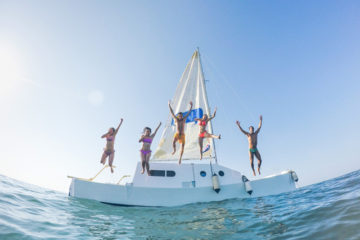The International Certificate of Competence (ICC) training program for sailing typically covers a range of theoretical and practical topics to ensure that individuals are competent in handling sailing vessels safely and effectively. The ICC Certification exact curriculum can vary slightly depending on the requirmentsa of the participant, but here are the core components commonly included in an ICC training program:
Sailing Theory
This part of the training program covers fundamental sailing theory, including topics such as:
Nautical terminology
Parts of a sailing vessel
Points of sail
Sail trim and adjustment
Knot tying and rope work
Basic navigation principles
Rules of the road (collision regulations)
Weather forecasting and interpretation
Safety Procedures
Safety is a crucial aspect of sailing, and ICC training typically includes instruction on:
Man overboard drills
Fire safety and firefighting techniques
Use of life jackets and safety harnesses
Emergency procedures and equipment
Abandon ship procedures
Practical Sailing Skills
This part of the training involves hands-on experience and practice in handling a sailing vessel. Skills taught often include:
Rigging and de-rigging a sailboat
Raising and lowering sails
Sail handling, including tacking and gybing
Boat maneuvering under power (using the engine)
Anchoring and mooring techniques
Navigation exercises, such as plotting courses on charts
Navigating buoys and markers
Handling lines and winches
Docking and leaving a berth
Practical Navigation
Training programs typically include practical navigation exercises using charts and navigation instruments. This may include plotting courses, taking bearings, and determining positions.
ICC Certification – Practical Assessments
Trainees are evaluated on their ability to perform various sailing tasks and demonstrate their competence in practical sailing skills. This often includes handling a sailboat in different wind conditions and performing safety drills.
ICC Certification – Written Examination
Most ICC training programs include a written examination to assess your theoretical knowledge of sailing, navigation rules, and safety procedures.
Vessel Types
Training programs may cover different types of sailing vessels, including keelboats, dinghies, and catamarans, depending on the specific ICC certification you are pursuing.
Local Regulations
Training programs may also provide information on local regulations and laws related to sailing in the area where the training is conducted.
ICC Certification – Practical Experience
This ICC training programs may require a minimum number of logged sailing hours or experience before allowing you to take the assessment.
Provisional ICC
In some cases, a provisional ICC may be issued after successfully completing the training but before passing the final assessment. This allows you to sail under supervision until you gain more experience and can take the practical assessment.
Summary
It’s important to research and choose a reputable training organisation that offers ICC courses tailored to your level of experience and the type of sailing you plan to do. The specific content and duration of the training program can vary. We will ensure that yuor training program meets the requirements of the ICC but more improtantly that yuo have the skills to get out on the water and use your ICC for the best and safest sail.
Additional information
| Physical Rating | 3/5 – Get you moving. Good level of physical ability required |
|---|
When preparing for an International Certificate of Competence (ICC) sail training assessment, it’s essential to bring the necessary documentation, equipment, and personal items to ensure a smooth and successful assessment.
Here’s a checklist of items you should consider bringing:
Proof of Eligibility: Ensure you have proof of your eligibility for the ICC assessment, which may include evidence of prior sailing experience, relevant qualifications, or prerequisites set by the training organisation.
Valid Identification: Bring a government-issued photo ID, such as a passport or driver’s license, to confirm your identity.
Appropriate Clothing: Dress in suitable sailing attire, which typically includes:
Deck shoes or non-marking, non-slip footwear
Weather-appropriate clothing (layers are recommended)
A waterproof jacket or foul weather gear
Sun protection (hat, sunglasses, sunscreen)
Sailing gloves (if preferred)
Life jacket or personal flotation device (PFD)
Logbook: If you have a sailing logbook or record of your prior sailing experience, bring it to demonstrate your sailing history and logged hours on the water.
Navigation Equipment: Depending on the assessment, you may need to bring navigation tools, such as:
Nautical charts for the assessment area
Navigational instruments (dividers, parallel rulers, protractor)
Pencils, erasers, and a waterproof pen
Boating Equipment: Some training organizations may provide the sailboat for the assessment, but if you are required to bring your own vessel, ensure it is in good working condition and equipped with all necessary safety gear, including life jackets, flares, fire extinguisher, and a first aid kit.
ICC Application Form: Complete any required application forms and bring them with you. These forms may be provided by the training organization or the relevant maritime authority.
Fees: If there are any fees associated with the ICC assessment, make sure to bring payment in the accepted form (cash, credit card, check) as specified by the training organization.
Refreshments: Depending on the duration of the assessment, bring snacks and water to stay hydrated and energized.
Communication Devices: Bring a mobile phone or other communication device, if allowed, for safety purposes. Make sure it is in good working order and adequately charged.
Sailing Manuals and Reference Materials: If you have specific sailing manuals, textbooks, or reference materials that you find helpful, you may want to bring them for quick reference during the assessment.
Confirmation Details: Confirm the date, time, and location of the assessment with the training organization beforehand to avoid any scheduling conflicts or misunderstandings.
A Positive Attitude: Approach the assessment with a positive and open mindset, ready to learn and demonstrate your sailing skills and knowledge.
Always check with the specific training organization or maritime authority conducting the ICC assessment for any additional requirements or guidelines specific to their program. Being well-prepared and organized will help ensure a successful ICC sail training assessment.





Tour Reviews
There are no reviews yet.
Leave a Review